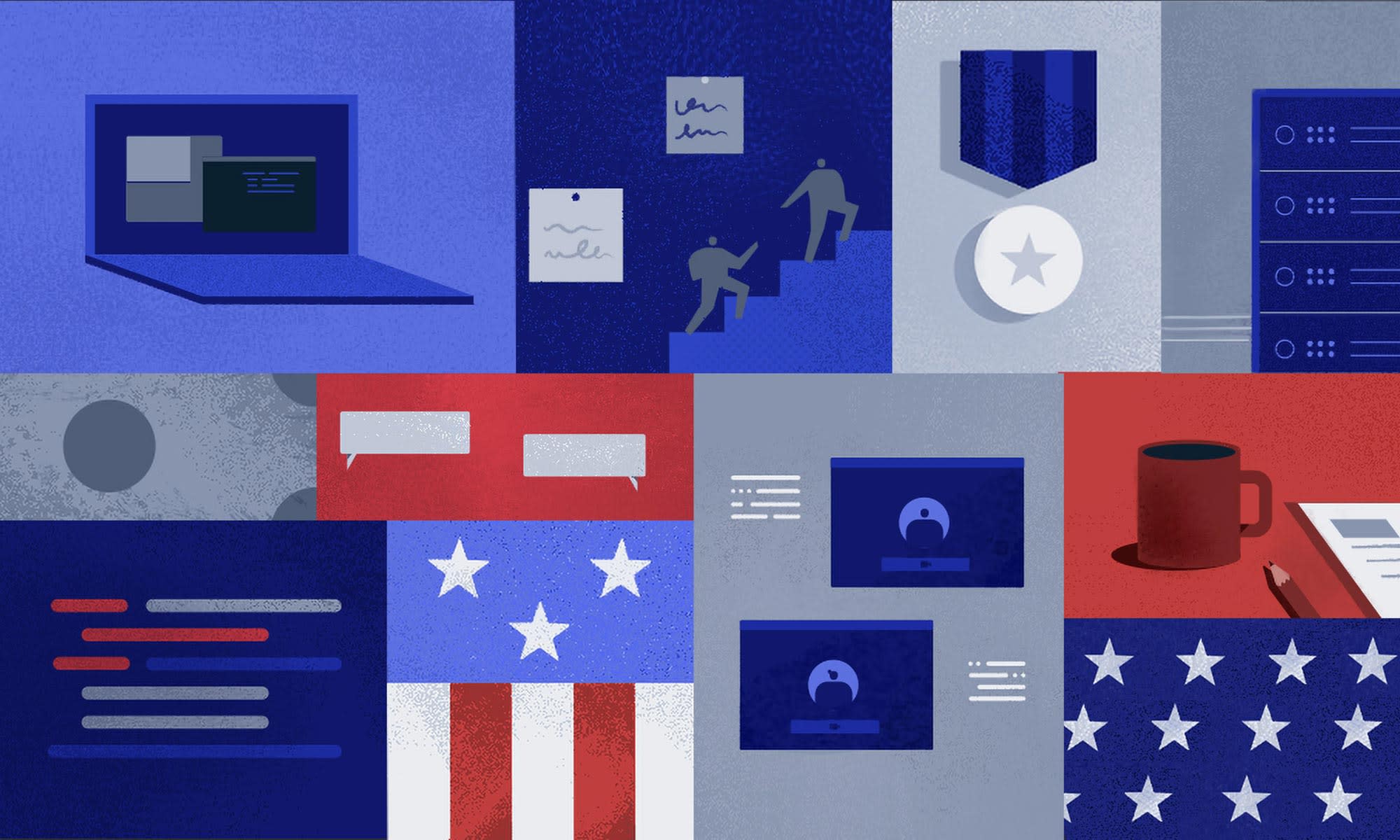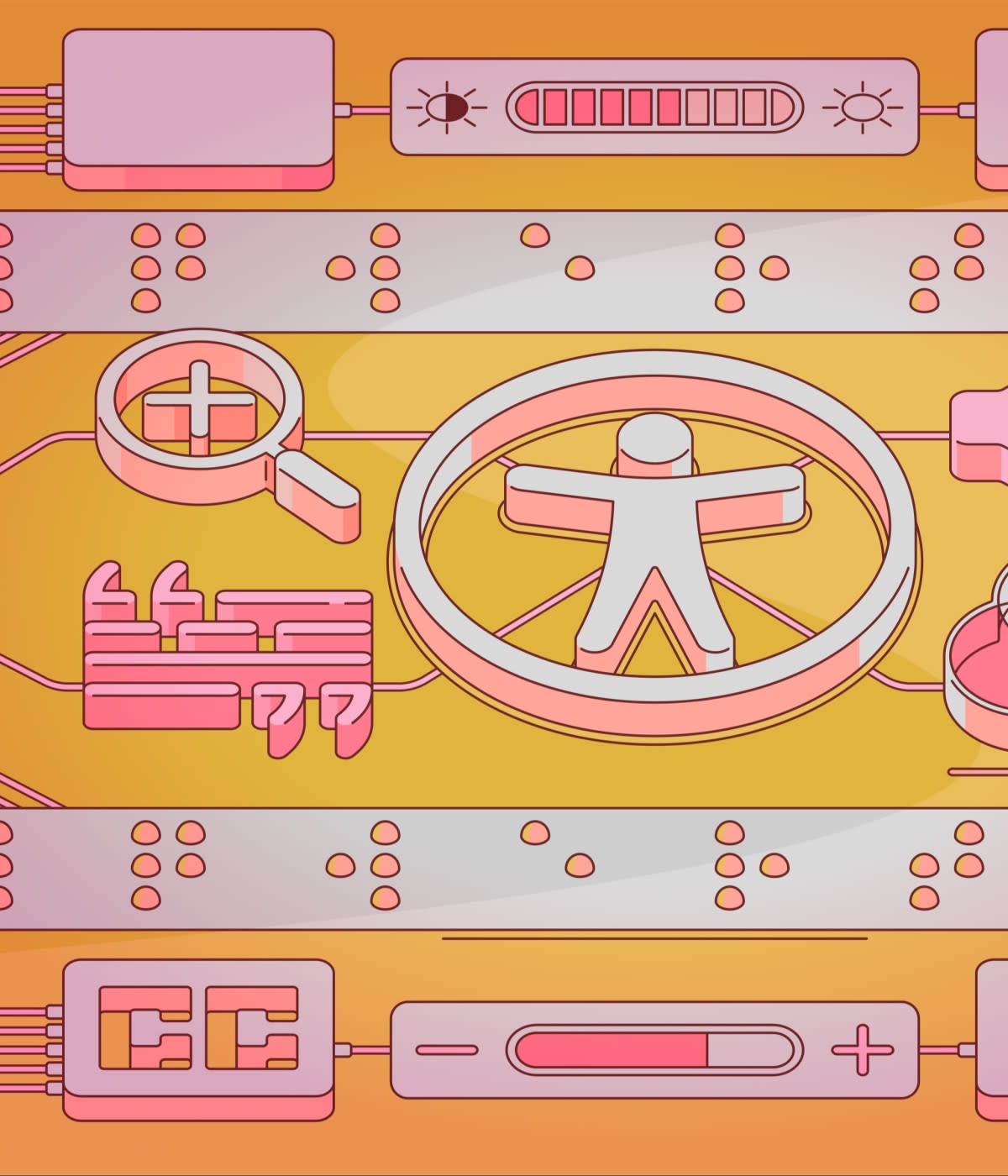Krystyna Ewing decided to learn to code in 2014. The 27-year-old Army veteran was working the night shift at a technical support job. But Ewing wanted a more fulfilling career.
Programming seemed like the way to go. Ewing excelled at problem solving and logic puzzles. With a child on the way, going back to school full-time for a bachelor’s in computer science wasn’t an option. So they started looking into “code bootcamps”—programs that offer a crash course in software development, usually over the course of six to 10 weeks.
The problem was, the programs were too expensive. Tuition exceeding $15,000 isn’t uncommon, and few camps at the time met the strict requirements needed to use GI Bill funds. “I just wanted to find a way to get training without going broke or starving,” they said.
Ewing wasn’t alone. Many veterans want to start careers in the tech industry, but face a variety of barriers, both financial and cultural.

Today, veterans are mobilizing to break down those barriers. Some volunteer to teach classes for Code Platoon and Vets Who Code(VWC), code bootcamps designed specifically for veterans and military families. Others provide mentorships and share resources through Operation Code, a community of veterans and military spouses interested in tech. At the end of the day, they’re all doing what they do best: working as a team to accomplish their goals.
Veterans are built for tech
Many veterans face challenges translating the skills they learned in the military to the civilian workforce.
Until the COVID-19 pandemic, the unemployment rate among veterans was declining steeply for several years. But underemployment is still a persistent problem. A third of veteran job seekers are working in jobs that don’t take full advantage of their skills and abilities according to a report published by LinkedIn. That’s about 15.6% more than non-veteran job hunters on the platform.
Military spouses, meanwhile, face their own struggles in the workforce. A survey conducted by Blue Star Families last year found that 24% of active duty military spouses were unemployed and 77% of those with jobs reported at least one experience with underemployment.
The technology sector is a promising field for veterans and military spouses because of high growth, good pay, opportunities for remote work, and a new sense of purpose. And it’s a field where veterans can apply many of the traits they honed in the military.
“One of the biggest things we bring are the critical thinking and problem-solving skills that come from having unpredictable real-world things happen to you before the age of 25,” says Jerome Hardaway of Veterans Who Code. Whether it’s code deployment problems, unforeseen bugs, or changing deadlines and requirements, vets are good in a pinch.

They also know how to work as a team. “We’re used to working as a unit,” Hardaway says. “Our primary focus is to make sure everybody wins on our team.”
That teamwork expands into knowledge sharing and training. It’s fairly common for private sector organizations to have important, albeit under-documented, IT systems or software that only a single employee is familiar with. If that employee resigns or has to take an unexpected leave of absence, making changes to those systems can be a nightmare. That’s not the norm in military organizations, where it’s expected that all systems run smoothly even as personnel leave or transfer to other roles or locations.
“Veterans are trained to train the people who are going to replace them,” says Rod Levy, who founded Code Platoon but is not a veteran himself. “You don’t want to be a silo of knowledge and take all this knowledge with you when you leave.”
Veterans also bring discipline. Programming and other technical jobs are challenging, rewarding careers. They also require employees who will stick with difficult problems, read dry documentation, and continuously learn new skills. Veterans are used to poring over difficult documents and learning on the fly. “I spend a lot of time in Excel sheets, not because I want to but because it needs to be done,” says Ashley Templet, an Air Force veteran who now works as a security engineer at Avalara.
According to the LinkedIn report, 59.1% of employers responded that veterans perform “better than” or “much better than” their non-veteran counterparts.
But many veterans and military spouses find it hard to start tech careers. For one thing, Hardaway says, there are inaccurate stereotypes about veterans, especially enlisted service members. For example, the myth that veterans aren’t critical thinkers because they’ve only been conditioned to follow orders—when in fact, service members are required to think independently and solve problems in the field.
“Once, someone asked me, ‘Can veterans even learn how to code?’ People thought I was the exception, not the rule,” Hardaway told us.
The skills to pay the bills
Fortunately, things have changed since Ewing first started looking at code camps. In 2017, congress passed the VET TEC Act, launching a five-year pilot program that helps veterans and military families pay for technical training without dipping into their GI Bill funds. “It's no silver bullet but it’s a big step in the right direction,” Operation Code executive director Conrad Hollomon says.
Meanwhile, Hardaway and Levy looked at the code camp affordability problem and came up with other solutions. Both Vets Who Code and Code Platoon are volunteer-run, non-profit code camps specifically for veterans, which each have different funding models. Vets Who Code charges no tuition at all for its program and is funded entirely by donations and fundraising. Code Platoon, meanwhile, opted to offer scholarships to pay for its $16,000 tuition. It now also accepts VET TEC funds.

Why create code camps specifically for veterans? “They’re older and more mature than many of the other students entering a bootcamp or college,” Levy says. “So when they enter Code Platoon, they’re entering a peer environment. They become tight-knit as they go through the program.” The curriculum is designed specifically to work around common veteran commitments, like reserve duty.
The Vets Who Code program is likewise designed to cater to veterans and their lives. “We just focus on the skills, so people can provide for their families,” Hardaway says.
One big thing that Vets Who Code does differently from general audience code camps is that it uses structures and terminology familiar to vets. For example, the military uses “sit reps” (situation reports) to share information and updates, not unlike the way software development teams have daily “stand-up” meetings. Using the analogy, Vets Who Code is able to help veterans more smoothly transition from the military to the civilian workforce. “The metaphors make a lot of sense,” says Vets Who Code alum Schuster Braun. “There’s a lot of shared context they can tap into. We have a lot of shared experience.”
One big way the two programs differ from each other is their curriculums. Both constantly assess their curriculums to keep them up-to-date and ensure they’re teaching the skills employers are looking for. Both offer full-stack programming training. But they diverge on some specifics.
Vets Who Code teaches JavaScript for both front-end and back-end programming with a special focus on serverless technologies. “It’s where the industry is going,” Hardaway says. “Most companies are migrating to serverless because it helps them build applications faster with less complexity.”
Code Platoon, meanwhile, teaches both JavaScript and the increasingly popular programming language Python. Both Vets Who Code and Code Platoon also teach the fundamentals of computer science, which is transferable to other languages and technologies, and covers topics like version control with GitHub and modern application development processes that help prepare students to hit the ground running once they land jobs.
Both programs have strong track records that keep them competitive with other code camps. The Council on Integrity in Results Reporting reports that 94.7% of Code Platoon alumni from the second half of 2019 landed jobs in development within 180 days with an average salary of $63,750. Hardaway says 94% of Vets Who Code alumni found jobs within 12 months with an average salary of $85,000.
The mission is ongoing
Gaining skills is only one part of the struggle veterans—or anyone else—faces when looking for a job in tech. You need to know what managers look for in a resume and how to pass a technical interview. And once you land a job, it helps to have mentors to guide you through your career. Programmers also need to constantly learn new technical skills. Veterans are pitching in to help each other here, as well.

Both Code Platoon and Vets Who Code help with job hunting and interview prep and offer support to alumni even once they’ve landed jobs. “We encourage our alumni to be active members of our alumni association, where they can lead and participate in hackathons and other alumni-related activities that focus on software development,” Levy says.
Meanwhile, Hardaway meets with alumni for one-on-one meetings to discuss their careers, and the organization hosts “Lunch and Learn” sessions to help alumni continue their education. “We help with everything from reentry to retirement,” Hardaway says. “We don’t just focus on getting someone their first job.”
Not all veterans attend those two code schools—or any code school for that matter. Plus there are plenty of jobs in the tech industry that don’t involve coding.
That’s why many vets flock to Operation Code’s Slack workspace, which is open to anyone. At its core, Operation Code is an online community dedicated to helping veterans and military families learn about technology careers, find mentors, prepare for job interviews, and navigate all the various stages of a tech career.
For example, Templet landed an internship with Oracle early in her career through a program the company specifically designed for veterans and military spouses. “I wouldn’t have even known to apply for that internship if it wasn’t for Operation Code,” she says.
The community also helps vets figure out what sorts of tech careers are a good fit for them. For example, Ewing started out thinking they wanted to be a programmer. They hadn’t seriously considered a career in UX design, despite a passion for art and design stretching back to childhood. That is, until Hollomon encouraged them to take a scholarship to study UX design through the online educational platform Treehouse. It turned out that UX design was a much better fit, and Ewing now works in UX design at True Link Financial.
There are lots of different places online to learn about tech internships or career paths. But it can help to have a community that understands where you’re coming from while making the transition from military to civilian life. “After re-entering the civilian world, it’s a good feeling to talk to people who understand the 20,000 acronyms that you learned in the military,” says Andrea Griffiths, an Army veteran and GitHub community program manager who is also involved with Operation Code. “They stand at attention during the National Anthem. These are things that I cannot unlearn, and I think everyone that serves takes these bits of the Army with them.”
Ultimately, all of these programs are about more than just helping veterans or military families find jobs or build skills. They also give veterans a sense of purpose. “We try to bring you to the community, give you some ownership of the organization and help you contribute backHardaway says. “Our model is veterans helping veterans.”



